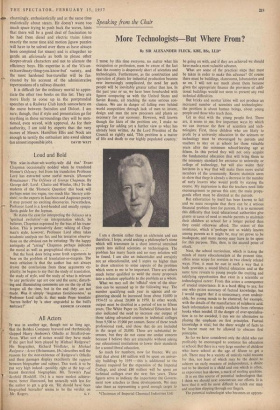Loud and Bold
'His wise-in-chast-wit-worthy-wife did rise.' Even . Chapman occasionally nodded when he translated Homer's Odyssey, but from his translation Professor Lord has extracted some useful morals. (Homeric Renaissance : The OcOssey of George Chapman. By George deF. Lord: Chatto and Windus, 18s.) To the students of the 'Homeric Question' this book will perhaps seem too vague, too much like 'literary criti- cism'; to the experts in Jacobean and Augustan poetry It may present no exciting discoveries. Nevertheless, Professor Lord is a level-headed and usually sympa- thetic guide for the layman.
He states the case for interpreting the Odyssey as a 'spiritual evolution'—an interpretation which, he believes, Chapman expressed by the bias of his trans- lation. This is persuasive.tly done; talking of Chap- man's style, however, Professor Lord often takes academic analysis too far, and his tentative observa- tions on the obvious can be irritating: 'By the happy ambiguity of "erring" Chapman perhaps indicates the moral as well as geographical strayings. . .
But the book does bring some fresh arguments to bear on the problem of translation-as-exegesis. The main criticism is that the author has not always drawn the conclusions from these arguments ex- plicitly; he begins to say that the study of translation, the study of style, and the study of what is relevant to any particular age are one and the same; disturb- ing and illuminating comments are on the tip of his tongue all the time, but in the end they are not made. Was it simply 'Augustan fastidiousness,' as Professor Lord calls it, that made Pope translate 'barren heifer' by 'a steer ungrateful to the bull's


































 Previous page
Previous page